Pawel Zak “Close Acquaintance” 12.03 – 16.04.2005
March 12, 2005 8:46 pm |
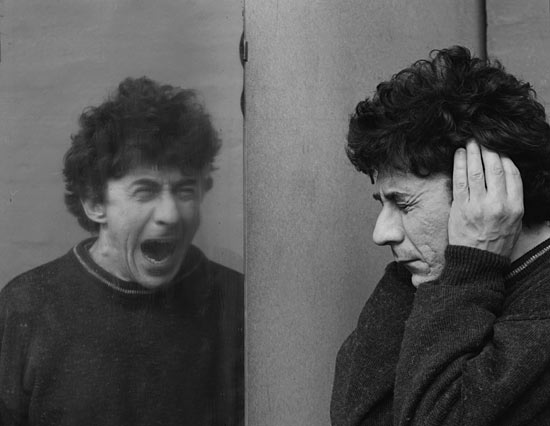 Pawel Zak “Close Acquaintance” De Poolse fotograaf Pawel Zak presenteert zijn recente serie “Close Acquaintance” met een reeks zwart/wit zelfportretten die tegelijkertijd als intrigerend, poetisch, introspectief, speels en vakkundig omschreven kunnen worden. Pawel Zak demonstreet met deze reeks op een briljante manier dat de klassieke fotografie nog lang niet dood is en dat de spiegel reflex camera nog steeds een toekomst heeft. De tentoonstelling zal te bezichtigen zijn vanaf 12 maart t/m 16 april 2005 in de Gallery WM, Elandsgracht 35, Amsterdam. De opening vindt plaats op zaterdag 12 maart van 17.00 tot 19.00 uur. U bent van harte welkom. 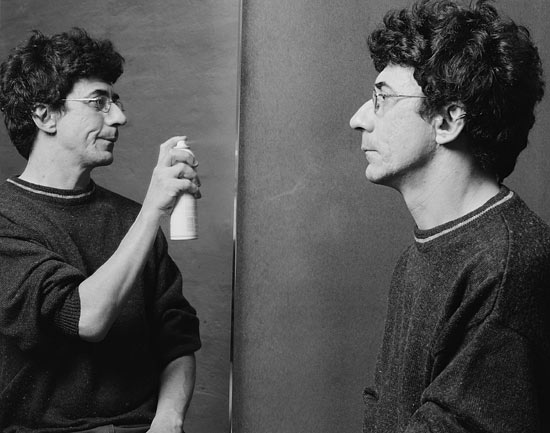 Pawel Zak “Close Acquaintance” Pawel Zak, “Close Acquaintance” A MIRROR, reflections – a reflex camera, until quite lately the most popular kind of photographic camera. That is why many photographers often relate to it in their work. A looking-glass, mirrored picture becomes a starting point, one of the main inspirations. Multiple portraits in mirrors (among others Szpakowski, Witkacy, Duchamp), lots of pictures based on principle of reflection justify assumption that reflections of this kind will be releasing still new ideas and projects. This is also the case of the latest series of works of Pawel Zak. The photographer treats his newest project not quite seriously, suggesting beholders to observe a kind of a game he is playing with mirrored image. And it is quite probable that this game played before our eyes is rather about the artist and what he thinks about himself. There is a kind of inconsistency in the portraits done by Pawel Zak and some strange disturbances denying laws of physics – after close scrutiny of each of the photographs it comes to our minds that the photographer tries to deceive us by disturbing logic of the image. It proves that this reflection, this photographic print is living a life of its own and does not have to be absolutely precise copy of what was in front of the camera. A photographic image may embrace more meanings than it seems to have at the first glance – also when it is a faithful mirror reflection. If it is not so – it is a somewhat deceitful gesture of the artist – he can provoke such situation in almost unnoticeable way. In such case we start to think deeper about objectivity of photographic message and genuineness of photographic recording and non-falsified truths it relates – even if sometimes they are concerning ourselves. Marek Grygiel (2004) |
|
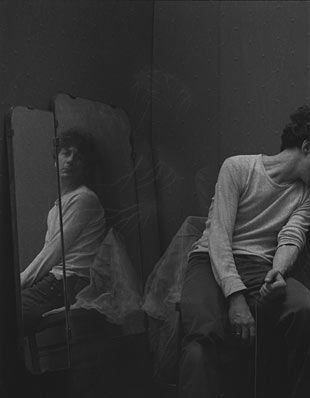 Pawel Zak “Close Acquaintance” |
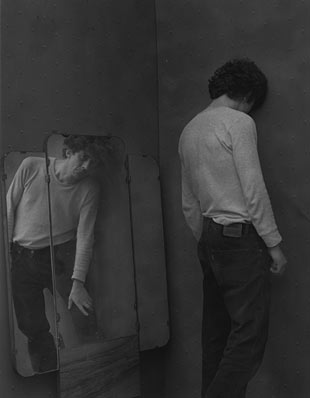 Pawel Zak “Close Acquaintance” |
A Close Acquaintance – Photographs of Pawel Zak“How am I to get in?” asked Alice again, in a louder tone. “Are you to get in at all?” said the Footman. That’s the first question, you know.” It was, no doubt: Only Alice did not like to be said so. (Lewis Carroll, Alice’s Adventures in Wonderland, p. 58) An everyday ritual of getting out of bed. Still without any thought andwithout a language I am withdrawing slowly my successive limbs from a torpid lethargy. It takes me a long time to clamber up from my bed. Finally, in some inconceivable way I manage to get to the bathroom. I turn the light on. I look into a mirror. Aha, that’s me. “Nice to meet you!” My imago stays In its place, whole, in one piece. I have checked it. I am quiet. Millions Of people start their each day in a similar way. But how can we be sure what we really see in these mirrors. What are we looking at? Photographs of Pawel Zak are questioning possibility of receiving a simple answer for this question. – Do we see ourselves? The real ourselves? A reflection of the real ourselves in the mirror? And perhaps it 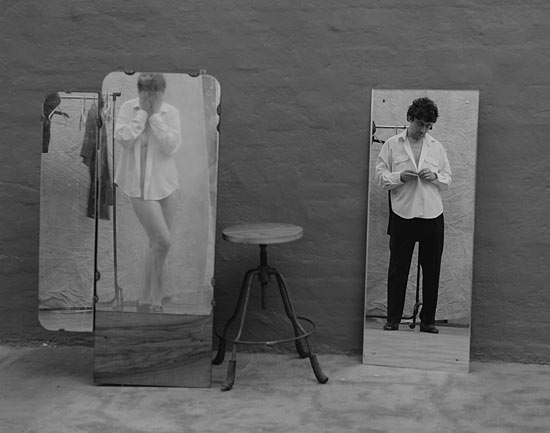 Pawel Zak “Close Acquaintance” In order to get rid of distressing thrill of uncertainty we come nearer to these mirrors. We are making a test. Left hand goes up – a reflection does the same. It is too simple. Right hand snatches at the left ear and in the same time the head is wagging sideways and the mouth is twisted in clownish smile. And once again the reflection perfectly follows our movements. But drawing near to this mirror-sheet is only beginning of playing Alice from Through the Looking-Glass and the beginning of a long chain of doubts. Pawel Zak planted before us and before himself a whole wood of them. Alice knows it well that “This must be the wood, where things have no names. I wonder what’ll become of my name when I go in?” (p.154) – she is asking herself just before she forgets who she is. But at the end she meets a deer, which calls her by her name thus creating her anew. And what if it is not me looking at “it” but this “it” is looking at me? If it is so then who am I? Why I am the one whom “it” is telling that I am? And how do I know that it is me? By posing these questions I am becoming Alice who learned that she exists only in dreams of the Black King about whom she is just dreaming… At this moment “it” starts to wink at me mischievously. Furthermore, it is distorting itself and making faces. But moments later it becomes sad, drops its head and turns its back at me – while my face is still turned toward it! I am trying to call it back (however I am not sure how to call “it” now), but “it” does not react at all. The closer I come, the further “it” moves away from me. What does it all mean? After all I am I and my reflection is only my reflection. We will not have a row and offend each other now, don’t We already feel the power of mirror-pane separating inseparable partners or – perhaps – adversaries. Photographs of Pawel Zak are in unusually acute way discovering this everyday effort of getting stuck together into one entity, of endless creating myself anew. There is a tumult of everyday battle for wholeness and countless skirmishes for feeling of reality. There is clearly sensed tension of constant negotiating of one’s own identity. And these photographs do not take away this tension at all. On the contrary, the very character of photographic technique complicates even more this already multi-leveled relation. The surface of the picture becomes additional “screen” “reflecting” the whole situation in a wider context and there is a new participant of the exchange – the artist. How to define the source of identity now? Who is who? Who is looking at whom? The photographed at his mirror reflection or the photographing at himself being photographed while being reflected in the photographed mirror? And what will happen when also a beholder will join this exchange process and we will try to take also his/her glance into account? Terribly! After all there still is the idea presented by Unicorn (who did not believe in existence of children) to Alice (who did not believe in existence of Unicorns): “Well, now that we have seen each other,” said the Unicorn, “if you’ll believe in me, I’ll believe in you. Is that a bargain?” (p.200) Magda Pustola (translated by Krzysztof Wojciechowski) |
|
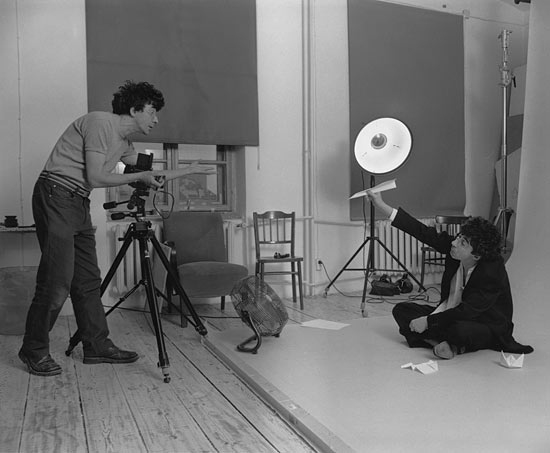 Pawel Zak “Close Acquaintance” |
|
| Pawel Zak tel. (+48) 601395265 e-mail: pawelzak1@wp.pl Born in 1965. He studied social sciences in the Warsaw University and photography in the Higher School of Photography of the Union of the Polish Art Photographers and in the Academy of the Fine Arts in Poznan (Department of Multi-media Communication, graduated in 2002). Pawel Zak uses photography as medium of personal expression already more than ten years. During this time he presented his works at dozen or so individual and few dozens of collective exhibitions, inter alia in Denmark, Holland, Switzerland, Belarus, the Czech Republic, Slovakia, Sweden and Germany. His works are in private collections in Poland and abroad. Selected photographic series: “Tales” – from 1997 untitled – from 1999 “A Close Acquaintance” |
